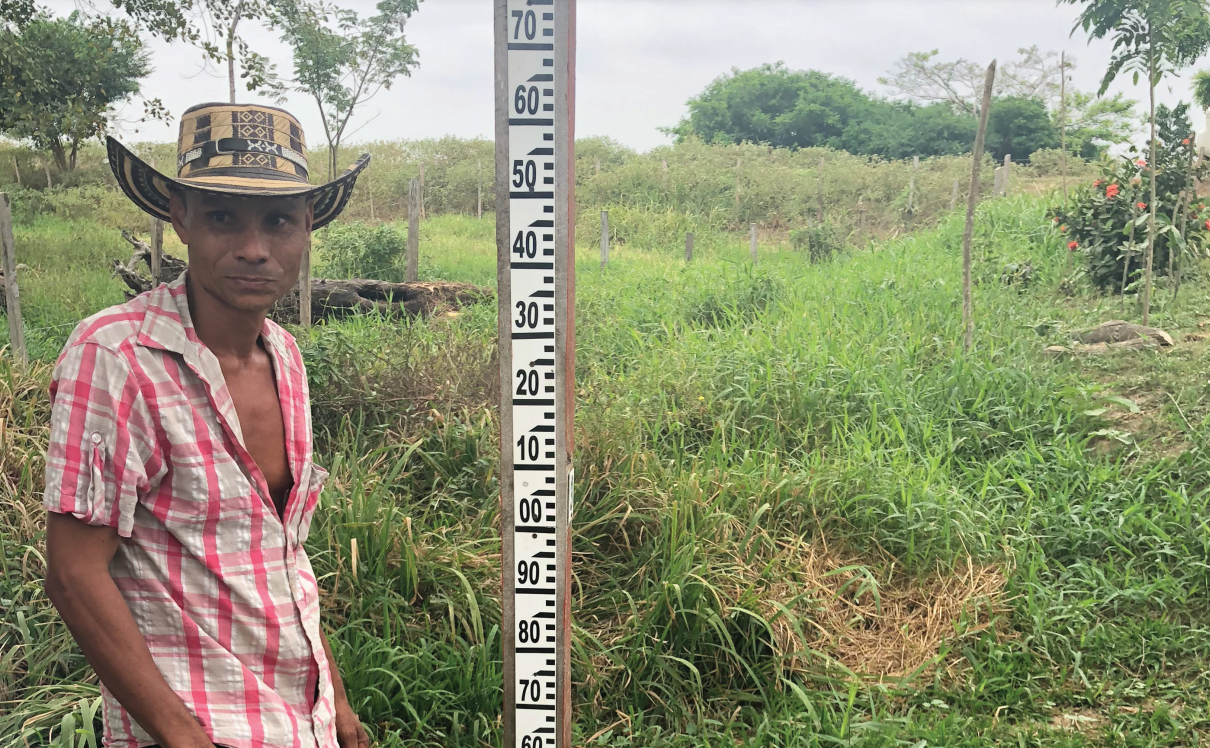AF project in the region of La Depresión Momposina in Colombia is reducing vulnerabilities of communities and wetlands to climate-related flooding and drought risks by promoting healthier watersheds and supporting poor rural populations.
Adaptation Fund Study Shows How Disaster Risk Reduction and Early Warning Systems Strengthen Long-Term Resilience to Climate Change
Washington, DC (November 16, 2023) – The world faces an escalating threat from extreme climate events, leading to devastating impacts on livelihoods, ecosystems, and infrastructure, particularly on the most vulnerable. The urgent need to address these risks has prompted a lot of international attention on disaster risk reduction (DRR) and early warning systems (EWS), among other climate change adaptation measures.
A new Adaptation Fund (AF) study (Spanish) emphasizes the crucial role of DRR and EWS in confronting the intensifying challenges associated with climate change. Drawing on AF project examples, the study offers a comprehensive overview of the Fund’s experiences and key lessons gleaned from these interventions. It delves into seven case studies across the portfolio, showcasing successful approaches in DRR and EWS to empower vulnerable communities to achieve long-term resilience.
The study’s methodology involved a comprehensive review of academic and ‘grey literature’, as well as AF policies and guidelines, project documents, and interviews with project leaders.
The AF, renowned for its pioneering role in adaptation finance, has been at the forefront of preventing or helping to minimize further loss and damage through its extensive portfolio of adaptation projects. With a robust investment in dedicated DRR and EWS, which total about 18 percent of the Fund’s portfolio, , the Fund has demonstrated a commitment to building disaster resilience in vulnerable communities. Notably, 526 EWS have been established at the local, national or regional levels, enabling communities worldwide to access critical climate information and hydro-meteorological services.
“As an advocate of Early Warnings for All, a UN initiative to protect the global population with EWS, many of the AF’s projects are helping to reduce and avert further loss and damage,” said AF Head Mikko Ollikainen. “The Fund is committed to supporting developing countries to build resilience to climate disasters, and this study provides valuable evidence and recommendations to help us achieve that goal through concrete, scalable examples on the ground.”
The study found that AF projects employed various innovative approaches, including building risk management tools and systems, expanding climate-proof infrastructure, and supporting community-based DRR. Integrating these approaches across scales, sectors, and stakeholders was highlighted as essential for project success.
“This study provides valuable insights into how DRR and EWS projects can be designed and implemented to strengthen long-term resilience to climate change,” says Cristina Dengel, AF’s knowledge management officer who led the production of the study. “It offers advance knowledge within the adaptation community and contributes insights into effective project approaches.”
Critical lessons were identified in the study. For EWS, these include the importance of improved data quality in decision-making, the impact of understanding and communicating risks on outcomes, and the significance of well-suited hydro-meteorological and community institutions for success. For example, the “Enhancing Adaptive Capacity of Andean Communities through Climate Services (ENANDES)” regional project in Chile, Columbia and Peru worked to tailor information to indigenous groups and different government sectors to help communities make informed decisions by having access to appropriate information. Highlighting the effectiveness of cross-regional collaboration, the project has recently been scaled up with additional funding from the Swiss Government.
In the realm of DRR, the study underscores the critical nature of community-led actions for long-term resilience. In Mongolia, a community-based, gender-responsive approach ensured that vulnerable community members’ needs were met, empowering women to lead and actively participate in 70 community groups managing flood risk interventions, with a focus on constructing flood-resilient toilets. Women’s involvement led to improved and adapted designs addressing accessibility and safety concerns for the entire household, and their central role in construction, procurement, quality control, and negotiations with the government ensured their ongoing operation and maintenance, providing community members with skills for sustainable infrastructure management.
The study also stressed the value of alignment with government structures to scale up initiatives, the importance of partnerships and coordination in advancing project goals, and the necessity of continuous learning opportunities to build capacity and support sustainability.
Several challenges were highlighted, including coordination among stakeholders, limited data and technical capacity, project sustainability issues, and the impact of the COVID-19 pandemic on project implementation.
The study concluded that while the Fund’s projects have provided a robust model for DRR and EWS, there remains significant work ahead. The report offered practical recommendations for strengthening climate resilience. These include:
- Strengthening coordination among stakeholders;
- Investing in data collection and technical capacity building; and
- Ensuring the long-term sustainability of projects.
Details of the report’s key findings and insights will be presented at the launch event of the study on Dec. 2 during the 28th session of the Conference of the Parties (COP28) to the UN Framework Convention on Climate Change (UNFCCC) in Dubai of the United Arab Emirates (UAE).
ABOUT THE ADAPTATION FUND
Since 2010, the Adaptation Fund has committed over US$ 1 billion for climate change adaptation and resilience projects and programmes, including 150 concrete, localized projects in the most vulnerable communities of developing countries around the world with over 40 million total beneficiaries. It also pioneered Direct Access and Enhanced Direct Access, empowering countries to access funding and develop local projects directly through accredited national implementing entities.
Communications: Matthew Pueschel, mpueschel@adaptation-fund.org or +1-202-473-6743
Attachments
| Attachment | Type | Size |
|---|---|---|
| Press Release, November 23, 2023 | 154 KB |



